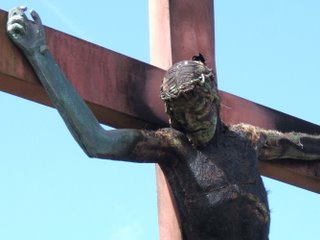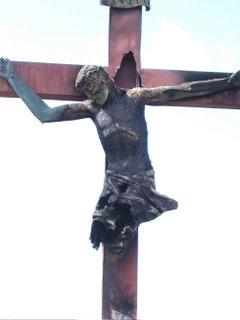Greenbelt reached it 40th edition this year. If you're not familiar with Greenbelt, it's an arts festival at Cheltenham race course, with a Christian background, but by no means limited to Christian input. Music, drama, literature, and talks addressing matters of faith and justice all feature, along with a good dose of silliness and fun. There are always several venues functioning, so there is plenty of choice as to how to spend the time. There are also plenty of stalls, (organic/fair trade/responsibly sourced) catering vans and displays to browse if you want to take a bit of time out. So what were my picks for 2013?
 |
| Jazz Church |
 |
| Andy Flannagan and friends |
There is usually some opening worship so we went along to
Jazz Church in the Big Top. Some classic hymns to new arrangements mixed with a jazz take on more contemporary ones, including "Heaven" by Gungor. Not something you could sustain very often, but a great idea and a fresh take on some familiar tunes. I also got along to Ben Cantelon on Sunday doing set of contemporary worship songs in a (dare I say) more conventional way.
Andy Flannagan closed things off on Monday with an interesting mix of him, a DJ and a man on a trombone. Somehow it worked.
Other options over the weekend, apart from the main worship on Sunday morning included eucharists from
Blessed, an alt-worship sacramental community, another used music from Les Miserables, there was a U2charist and a goth mass. You could get close to nature with Forest Church, of you prefer it quiet, Quakers and Franciscans offer alternatives!
The range of music on offer is always a highlight for me. You can usually find a good selection of singer-songwriters around the place at the Performance Cafe (this year changed to a venue not a cafe!), the CD tent, the Christian Aid tent and the Shed - the youth venue.
Martyn Joseph is usually on the list and he also hosts a session (The Rising) with musicians each day to talk about their work and share songs. We caught him talking to old-timer
Garth Hewitt and two newer artists,
Carrie Rodriguez and
Blair Dunlop. The latter 2 were so good we spent 2 hours sitting on the floor of the Performance cafe for their afternoon sets. Blair Dunlop is a great guitarist and writes interesting songs; Carrie Rodriguez is more country influenced but avoids the country cliches. Ably assisted by Luke Jacobs on guitar and sometimes singing and playing the violin at the same time, she had real quality. Also caught Stylusboy from Coventry and Andy Howie from Scotland, but missed plenty more.
 |
| The Boxettes at The Performance Cafe |
The word 'box' seemed to dominate music on Saturday.
Boxes is a solo project by Carey Willetts of the band Athlete (who headlined our first Greenbelt in 2009). Playing solo with a variety of backing effects he did a good set. Later
The Boxettes appeared. 4 singers and world champion beat boxer Bellatrix with no instrumentation or backing track, they delivered a great energetic set. More followed at the Performance Cafe, including an improvisation using three words from the audience. They're still unsigned and have far more talent than most 'girl groups', so somebody get them a contract! Also caught Black Rebel Motorcycle Club for some serious rock.
 |
Panel discussion featuring Jim Wallis
and Richard Coles |
The talks programme is always interesting, usually challenging, often inspiring and rarely without something controversial in there somewhere. Caught a nice little session with Martyn Joseph speaking about songwriting. Graham Cray spoke about what kind of church seems to be emerging for the future. Maybe I've been to too many sessions and read too many books on this, but I didn't find this very inspiring. However, Jim Wallis gave a very challenging, inspiring and yet very accessible address on 10 personal decisions you can make for the common good. I missed most of Steve Chalke, but I gather he was very good, but I did catch Rachel Mann on being a trans lesbian priest in the church today. that's not a talk I'd heard before, and it had a lot of insights.
 |
| Comedy from Paul Kerensa |
The Christian Aid tent had a comprehensive programme. regular live music from Harry Bird and the Rubber Wellies, Paul Field and others. Interviews and panel discussions took place throughout and we also got some poetry from Harry Baker and comedy from Paul Kerensa, who writes for Miranda and other radio and TV shows. Meanwhile the cafe team made it a place to take a break and get some refreshment.
What else? Well there's always something going on. Giant puppets, a stage where anyone can have a go at a song, art installations, book launches, a beer tent (The Jesus Arms) and bumping into people you haven't seen for years.
This year there was little rain, no mud, and a new layout to avoid the quagmire of 2012. They did well, given the constraints, and we're sure to be back in future years.






